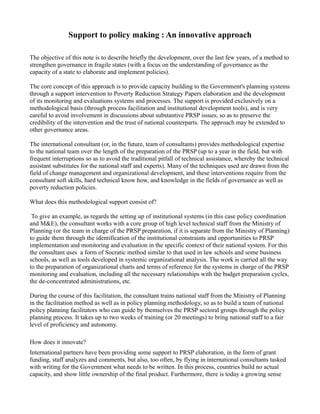Note describing PRSP work
- 1. Support to policy making : An innovative approach The objective of this note is to describe briefly the development, over the last few years, of a method to strengthen governance in fragile states (with a focus on the understanding of governance as the capacity of a state to elaborate and implement policies). The core concept of this approach is to provide capacity building to the Government's planning systems through a support intervention to Poverty Reduction Strategy Papers elaboration and the development of its monitoring and evaluations systems and processes. The support is provided exclusively on a methodological basis (through process facilitation and institutional development tools), and is very careful to avoid involvement in discussions about substantive PRSP issues, so as to preserve the credibility of the intervention and the trust of national counterparts. The approach may be extended to other governance areas. The international consultant (or, in the future, team of consultants) provides methodological expertise to the national team over the length of the preparation of the PRSP (up to a year in the field, but with frequent interruptions so as to avoid the traditional pitfall of technical assistance, whereby the technical assistant substitutes for the national staff and experts). Many of the techniques used are drawn from the field of change management and organizational development, and these interventions require from the consultant soft skills, hard technical know how, and knowledge in the fields of governance as well as poverty reduction policies. What does this methodological support consist of? To give an example, as regards the setting up of institutional systems (in this case policy coordination and M&E), the consultant works with a core group of high level technical staff from the Ministry of Planning (or the team in charge of the PRSP preparation, if it is separate from the Ministry of Planning) to guide them through the identification of the institutional constraints and opportunities to PRSP implementation and monitoring and evaluation in the specific context of their national system. For this the consultant uses a form of Socratic method similar to that used in law schools and some business schools, as well as tools developed in systemic organizational analysis. The work is carried all the way to the preparation of organizational charts and terms of reference for the systems in charge of the PRSP monitoring and evaluation, including all the necessary relationships with the budget preparation cycles, the de-concentrated administrations, etc. During the course of this facilitation, the consultant trains national staff from the Ministry of Planning in the facilitation method as well as in policy planning methodology, so as to build a team of national policy planning facilitators who can guide by themselves the PRSP sectoral groups through the policy planning process. It takes up to two weeks of training (or 20 meetings) to bring national staff to a fair level of proficiency and autonomy. How does it innovate? International partners have been providing some support to PRSP elaboration, in the form of grant funding, staff analyzes and comments, but also, too often, by flying in international consultants tasked with writing for the Government what needs to be written. In this process, countries build no actual capacity, and show little ownership of the final product. Furthermore, there is today a growing sense
- 2. that PRSPs too often do not live up to expectations for quality and effectiveness, particularly in fragile and conflict-affected countries. National high level civil servants working on PRSP elaboration generally constitute a pocket of excellence and commitment to development within their government. However, experience shows that in most fragile states these technocrats have very rarely been exposed to complex policy planning and implementation processes. Yet, they are eager for methodological support that respects their intelligence and builds on their skills and deep knowledge of the country’s situation. This approach provides strong capacity building that reaches all the policy planning departments of the Government. To our knowledge, such a hands-on approach to support the PRSP elaboration processes has never been used up until now. Even though it is much more intensive than any other form of PRSP support provided so far, it is at the same time much more respectful of the country's autonomy and has longer lasting capacity building effects on national planning staff. Abidjan, March 2010 Vincent Fruchart, Ph.D. Technical Assistant at the Ministry of Planning

